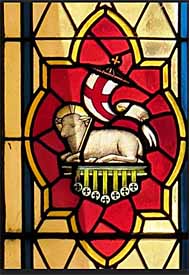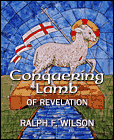
|
Old Testament
New Testament
Gospels
Acts
Paul's Letters
General Letters
Revelation
Topical Studies
Beginning the Journey (for new Christians). en Español

|
Old Testament
New Testament
Gospels
Acts
Paul's Letters
General Letters
Revelation
Topical Studies

|
Home
Bible Studies
Articles
Books
Podcasts
Search
Menu
Donate
About Us
Contact Us
FAQ
Sitemap
Day 19. Heavenly Zion and the Bride of the Lamb (Revelation 21:9-10)
 Agnus Dei, stained glass, St Patrick's Catholic Church, Lilydale, Victoria, Australia. |
We can't leave our survey of the Lamb's bride without looking at a strange and amazing passage in Revelation 21. After the judgment of Revelation 20, John beholds the New Heaven and the New Earth that Isaiah looked forward to (Isaiah 65:17; 66:22). In contrast to the corrupt city of Babylon, this is the Holy City, Jerusalem, heavenly Zion -- what St. Augustine calls The City of God.110
"1 Then I saw a new heaven and a new earth, for the first heaven and the first earth had passed away, and the sea was no more. 2 And I saw the holy city, new Jerusalem, coming down out of heaven from God, prepared as a bride adorned for her husband." (Revelation 21:1-2)
The Holy City depicted here is not the geographic Jerusalem on earth, but a New Jerusalem that descends upon the new earth, an earth made new after the terrible judgments on the Day of the Lord (2 Peter 3:10-13). What's more, the Holy City is compared to a bride, adorned for her wedding day. Who is this bride?
A few verses later, an angel says to John:
"9b 'Come, I will show you the Bride, the wife of the Lamb.' 10 And he carried me away in the Spirit to a great, high mountain, and showed me the holy city Jerusalem coming down out of heaven from God." (Revelation 21:9-10)
The Bride is the Holy City in a similar way that the Church is the Temple of God.111 Amazing! Certainly, the citizens of this New Jerusalem are the ones written or "enrolled" in the Lamb's Book of Life (see Day 12 and Day 18). The author of Hebrews tells us,
"You have come to Mount Zion and to the city of the living God, the heavenly Jerusalem, and to innumerable angels in festal gathering, and to the assembly of the firstborn who are enrolled in heaven...." (Hebrews 12:22-23a)
Long Betrothed, Now Married
In this analogy, the Bride has been betrothed to the Lamb up to this time. Paul writes,
"I betrothed you to one husband,
to present you as a pure virgin to Christ." (2 Corinthians 11:2)
At Christ's Victory, the wedding takes place, the union is consummated forever, the Bride lives at home with her Husband. This is the future salvation, the "day of redemption" we look forward to.112 Paul uses the figure of the Holy Spirit given as a guarantee of future glory.
"In him you also ... were sealed with the
promised Holy Spirit,
who is the guarantee of our inheritance
until we acquire possession of it, to the praise of his glory." (Ephesians
1:13-14)
Coming Down out of Heaven from God (Revelation 21:9-10)
Twice in Revelation 21 the motion of the Bride, the New Jerusalem, is indicated:
"Coming down out of heaven from God." (verse 2)
"Coming down out of heaven from God" (verse 10)
What's going on here? We're not exactly sure.
It seems like God has a future for this earth in the New Age. Peter foretells the utter destruction of the heavenly bodies by burning and being dissolved.113 The earth too will be cleansed.
'10 But the day of the Lord will come like a thief, and then the heavens will pass away with a roar, and the heavenly bodies will be burned up and dissolved, and the earth and the works that are done on it will be exposed.114 11 Since all these things are thus to be dissolved, what sort of people ought you to be in lives of holiness and godliness, 12 waiting for and hastening the coming of the day of God, because of which the heavens will be set on fire and dissolved, and the heavenly bodies will melt as they burn! 13 But according to his promise we are waiting for new heavens and a new earth in which righteousness dwells." (2 Peter 3:10-13)
 Available in PDF, and Kindle formats, |
In the New Earth, righteousness will indeed reside.115 And perhaps, we too will be back on earth, since the Word says that "they shall reign on the earth" with the Lamb (Revelation 5:10). It's a bit unclear, and I hate to spend much time speculating, but on that Day our future as the Bride of the Lamb will become crystal clear. John says in one of his letters,
"Beloved, we are God's children now, and what we will be has not yet appeared; but we know that when he appears we shall be like him, because we shall see him as he is. And everyone who thus hopes in him purifies himself as he is pure." (1 John 3:2-3)
Prayer
Father, we look into our future as the Bride of the Lamb in the New Jerusalem, the New Earth, wondering what it will all be like. What we will be like. But we know we will be with You, and that makes it all okay. In Jesus' trusted name, we pray. Amen.
Day 19 Meditation (Revelation 21:9-10). Why do you think
the New Jerusalem is compared to a Bride adorned for her wedding. What is the
significance of the Bride descending down to earth? What might be God's plan for
this New Earth that has been cleansed by fire and recreated?
https://www.joyfulheart.com/forums/topic/1893-day-19-bride/
Endnotes
(References and Abbreviations)
[110] Augustine of Hippo, The City of God (Dē cīvitāte Deī contrā pāgānōs; ca. 413--426).
[111] 2 Peter 2:5; 1 Corinthians 3:16; Ephesians 2:20-22.
[112] Luke 21:28; Romans 13:11; 1 Peter 1:5; Ephesians 4:30; Hebrews 9:27-28.
[113] "Destroyed" (NIV), "melt" (KJV), and "be dissolved" (ESV, NRSV) in verses 10, 11, and 12 is the common Greek verb luo, which means here "to reduce something by violence into its components, destroy." It is used of a building being torn down, the stern of a ship breaking up in a storm, and, here, the parts of the universe being broken up and destroyed in the final conflagration (BDAG 607). The basic meaning of luo is to "loose, untie."
[114] "Laid bare" (NIV), "exposed" (ESV), "disclosed" (NRSV) at the end of verse 10 is the Greek verb heuriskō, which means here, "to discover intellectually through reflection, observation, examination, or investigation, find, discover" (BDAG 412). We see a similar "examination by fire" in 1 Corinthians 3:13: "Every man's work shall be made manifest: for the day shall declare it, because it shall be revealed by fire; and the fire shall try every man's work of what sort it is." The KJV translation, "burned up," is katakaiō, "burn down, burn up, consume" by fire (used in 1 Corinthians 3:15 of the final judgment) (BDAG 517). The reading "disclosed" is supported by ℵ B K P and others. The reading "burned up" is supported by the Byzantine text, the Vulgate, and a few other manuscripts.
[115] Katoikeō, "to live in a locality for any length of time, live, dwell, reside, settle (down)" (BDAG 534, 1a).
Copyright © 2026, Ralph F. Wilson. <pastor![]() joyfulheart.com> All rights reserved. A single copy of this article is free. Do not put this on a website. See legal, copyright, and reprint information.
joyfulheart.com> All rights reserved. A single copy of this article is free. Do not put this on a website. See legal, copyright, and reprint information.

